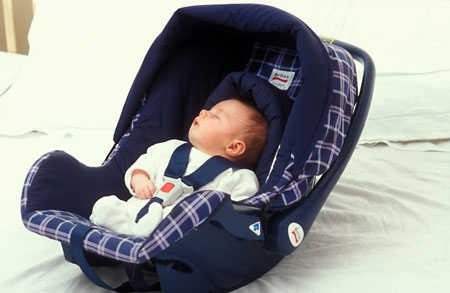By Kim Chisnell | 22nd July 2013
New research suggests parents should not leave their babies to sleep in car safety seats if they're not in the car.
The University of Auckland research shows a link between decreased oxygen levels and car seats, as babies' heads usually slump forward when they fall asleep in their seats.
Plunket says the findings are in line with its current advice to keep capsule use to an absolute minimum.
"We wanted to find out whether an insert that allows the infant head to rest upright in sleep could improve safety by reducing periods of low oxygen," says lead researcher Dr Christine McIntosh.
Leading midwife Kathy Fray says although she agrees the prolonged use of capsules are not the best, she's worried the suggestion will just lay more guilt on already guilt-ridden mothers.
"Safety-wise, this advice is probably sensible, but my concern is that it's yet more rules for parents to have to adhere to," said Ms Fray, author of best-selling parenting book Oh Baby.
"It just slathers another layer of guilt infusion on to mothers who are already feeling that they're doing the wrong things everywhere they turn."
She recommends that parents not plan for their babies to sleep in capsules while out of the car, a practice widely seen at present.
"However, if babies just incidentally fall asleep during a journey, mums shouldn't beat themselves up about it.
"Parenting can be stressful enough as it is."
The study showed the foam and plastic insert reduced the number of "stop breathing episodes" due to the blocking of the airway, as it allows the baby's head to rest in a neutral position.
However, Dr McIntosh says it did not significantly reduce the overall rate of moderate low oxygen events.
"Even reducing severity of the fall in oxygen levels is important and is a good indicator that the insert did help make babies safer," she says.
"This study also highlights the importance of not using cars seats as a place of sleep for infants. Sudden unexpected deaths in infants (SUDI) can occasionally occur in car seats [and] capsules."
The research notes the importance of car seats for safe infant transport, but shows concern at the reported high rates of babies spending more than 30 minutes a day in them, often to sleep out of the car as well.
The insert is available commercially and researchers hope it will reduce the incidence of SUDI.
Video of study explained on NZ news channel 3.


